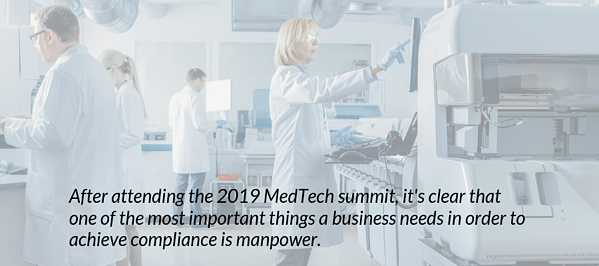Key Takeaways from the 2019 MedTech Summit
The 2019 MedTech Summit in Brussels was an event chock full of information and insight. This year, with more than 250 meetings over the course of five days, the main focus was a deep dive on the many facets of MDR and IVDR. Over 500 MedTech managers, directors, and executives were in attendance, all with the goal to learn as much as possible about these regulations and the various factors involved in achieving compliance before the upcoming deadlines.
A key session members of the Oxford team attended was Economic Operators Obligations: How to Create a Structure for all Economic Operators to Avoid Duplication and Ensure Compliance. Carol Mahon, Senior Director EMEA at Medtronic spoke about “creating quality agreements to centralize activities of the authorized representative, accessing guidance at a local level and implementing internal procedures for distributors to ensure access to documentation, strategies to ensure the authorized representatives and distributors comply with the requirements, and guaranteeing good and systematic communications.” There are a variety of nuances and subtleties to the MDR, and this session was a fascinating deep dive into the various actions that businesses will need to be aware of in order to achieve compliance for Economic Operators. Having a deeper insight and understanding into the EO piece of the MDR will help our organization offer a better level of support to our clients in their current and future MDR and IVDR projects.
Clinical Evaluation Reports (CERs) were another hot topic at the MedTech summit, with more than 20 meetings held on this topic alone. During a panel discussion examining the implications of the MDR on data management, collection, triage, and the reuse of data for regulatory purposes, Bassil Akra, the Vice President of the Global Clinical Focus Teams, expressed that moving away from a “paper based system” such as Excel is vital to the survival of businesses wanting to achieve MDR compliance. He stressed the importance of Eudamed and creating similar online databases to manage the sheer volume of information needed on a day-to-day basis. In addition, it’s crucial to have the expertise on your team to evaluate the data and create meaningful takeaways based on that information. Data mining and data integrity are certain to become a vital part of any MDR project from a data storage and administrative perspective. To that end, businesses should have a dedicated IT Architect to focus on the creation of data lakes — which will be used to store vast amounts of clinical data as per requirements from Eudamed.

Representatives from TÜV SÜD, one of the largest Notified Bodies to obtain certification, were in attendance, along with several other industry experts we had the pleasure to interact with. As members of our team gathered feedback surrounding MDR and IVDR, most individuals expressed that they were overwhelmed — the level of detail, size, and scope of MDR and IVDR makes it a difficult thing to implement while also maintaining day-to-day business operations.
After attending the 2019 MedTech summit, it’s clear that one of the most important things a business needs in order to achieve compliance is manpower. If you have the right team on board to support you with all aspects of compliance — from UDI labeling, supplier quality, manufacturing, economic operators, post market surveillance, market clinical follow up, technical file updates, CERs, and more — your business will be able to become compliant within the deadlines and ensure your products will be certified by your designated notified body for MDR compliance.



